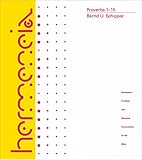Proverbs 1-15 : a commentary on the book of Proverbs 1:1-15:33 / by Bernd U. Schipper ; translated by Stephen Germany ; edited by Thomas Kruger.
Material type: TextLanguage: English, Hebrew, Greek, Ancient (to 1453) Original language: Hebrew, Greek, Ancient (to 1453) Series: Publication details: Minneapolis : Fortress Press, (c)2019.Description: xxvi, 580 pages : illustrations ; 25 cmContent type:
TextLanguage: English, Hebrew, Greek, Ancient (to 1453) Original language: Hebrew, Greek, Ancient (to 1453) Series: Publication details: Minneapolis : Fortress Press, (c)2019.Description: xxvi, 580 pages : illustrations ; 25 cmContent type: - text
- unmediated
- volume
- 9780800660673
- Commentary on the book of Proverbs 1:1-15:33
- BS1465 .P768 2019
- BS1465
- COPYRIGHT NOT covered - Click this link to request copyright permission:
- COPYRIGHT NOT covered - Click this link to request copyright permission: https://lib.ciu.edu/copyright-request-form
| Item type | Current library | Call number | Vol info | Status | Date due | Barcode | |
|---|---|---|---|---|---|---|---|
| Reference (Library Use ONLY) | G. Allen Fleece Library COMMENTARY | BS1465.H474 (Browse shelf(Opens below)) | PROV 1:1-15:33 | Available | 31923002035851 |
Browsing G. Allen Fleece Library shelves, Shelving location: COMMENTARY Close shelf browser (Hides shelf browser)
"This book is the English edition of the first volume of my commentary on Proverbs, published in the Biblische Kommentar series in 2018"--Page xi.
Foreword by Sidnie White Crawford and Harold W. Attridge ; preface by Bernd U. Schipper.
The book of Proverbs is more than the sum of its parts. Even if some individual proverbs and collections could be older, the overall composition stems from the late Persian or early Hellenistic period. In its present form, the book of Proverbs introduces the scribal student to the foundations of sapiential knowledge and its critical reflection. By discussing different worldviews and contrasting concepts on the relationship between God, the world, and humanity, the book of Proverbs paves the way to both the critical wisdom of Job and Ecclesiastes and the masterful combination of Wisdom and Torah in Sirach. Scholarly research has long situated the book of Proverbs within ancient Near Eastern literature but declared it to be something "alien" within the Hebrew Bible. In contrast to such a position, the present commentary interprets the book of Proverbs against the background of both ancient Near Eastern literature and the literature of the Hebrew Bible. One aim of the commentary is to discuss new ancient Near Eastern parallels to the book of Proverbs, with a special focus on Egyptian wisdom literature, including Demotic texts from the sixth to fourth centuries BCE. An equally important aim of this commentary is a detailed exegesis of Proverbs 1-15 as well as an analysis of the overarching strategy of the book of Proverbs as a whole. Taking the prologue of the book in Prov 1:1-7 as a hermeneutical key, the book of Proverbs turns out to be a masterful composition addressing both the beginner and the advanced sage. With its allusions to other biblical texts, including the book of Deuteronomy, the Psalms and the Prophets, the book of Proverbs can be connected to forms of scribal exegesis in Second Temple literature. By using the same scribal techniques as other literati of his time, the scribal sage responsible for some parts of the book as well as its final compilation seeks to provide deeper insight into the complex world of scribal knowledge and sapiential thought. - Dove
COPYRIGHT NOT covered - Click this link to request copyright permission:
COPYRIGHT NOT covered - Click this link to request copyright permission:
There are no comments on this title.




